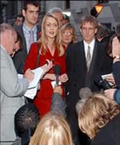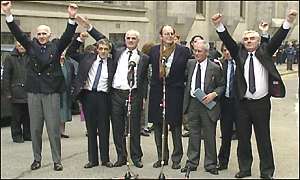 November 5th has long had many levels of resonance for me: Bonfire Night of course, when I was a child — fireworks in the garden and burnt baked potatoes from the fire; since the age of seven, celebrating the birthday of my oldest friend; and, since 2002, the memory of having to stand up in the witness stand in an Old Bailey court room in London to give a mitigation plea at the trial of my former partner, seeing his sentence reduced from the expected thirteen months to a “mere” six, and then having to deal for weeks with the media fall-out. A strange mix of memories.
November 5th has long had many levels of resonance for me: Bonfire Night of course, when I was a child — fireworks in the garden and burnt baked potatoes from the fire; since the age of seven, celebrating the birthday of my oldest friend; and, since 2002, the memory of having to stand up in the witness stand in an Old Bailey court room in London to give a mitigation plea at the trial of my former partner, seeing his sentence reduced from the expected thirteen months to a “mere” six, and then having to deal for weeks with the media fall-out. A strange mix of memories.
David Shayler endured a “Kafkaesque trial” in 2002 in the sense that he was not allowed to make a defence due to government-imposed gagging orders, despite all the relevant material already having been widely pubished in the media. The issues were summed up well in this New Statesman article from that time.
But the current debate about control orders used against so-called terrorist suspects — my emphasis — adds a whole new dimension to the notorious phrase.
This recent, excellent article in The Guardian by lawyer Matthew Ryder about control orders sums it up. How can you defend a client if you are not even allowed access to the information that has led to the original accusation?
The Liberal Democrats, in the run-up to the General Election earlier this year, pledged to do away with control orders, as they are an affront to the British model of justice. However, MI5 is putting up a strong defence for their retention, but then they would, wouldn’t they?
Much of the “secret” evidence that leads to a control order appears to come from telephone intercept, but why on earth can this evidence not be revealed in a court of law? It’s not like the notion of telephone bugging is a state secret these days, as I argued in The Guardian way back in 2005.
 Bearing all of the above in mind, do have a read of this interview with Paddy Hill, one of the victims of the notorious wrongful convictions for the IRA Birmingham pub bombings in 1974. After being arrested, threatened, tortured and traumatised, he was forced to confess to a terrible crime he had not committed.
Bearing all of the above in mind, do have a read of this interview with Paddy Hill, one of the victims of the notorious wrongful convictions for the IRA Birmingham pub bombings in 1974. After being arrested, threatened, tortured and traumatised, he was forced to confess to a terrible crime he had not committed.
As a result, he had to endure sixteen years in prison before his innocence was confirmed. He is still suffering the consequences, despite having found the strength to set up the “Miscarriages of Justice Organisation” to help other victims.
And then have a think about whether we should blindly trust the word of the security forces and the police when they state that we have to give away yet more of our hard-won freedoms and rights in the name of the ever-shifting, ever-nebulous “war on terror”.
Do we really need to hold terrorist suspects in police cells for 28 days without charge? Will we really continue to allow the head of MI6 to get away with blithely asserting, unchallenged, that British intelligence does its very best not to “benefit” from information extracted via unthinkable torture, as former UK ambassador Craig Murray so graphically described in his blog on 29th October?
I’ve said it before, and I shall say it again: the Universal Declaration of Human Rights was put in place for a reason in 1948. Let’s all draw a breath, and remember, remember.….
